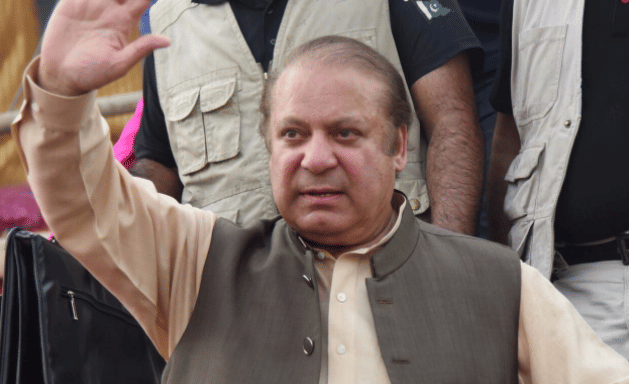Nawaz Sharif’s confrontational approach has caused concern within party ranks and some signs of dissent have already emerged
Nawaz Sharif’s options were limited after he was unceremoniously ousted from power last month by the country’s Supreme Court for being dishonest. He could go home quietly, or fight back to defend his legacy. He chose the latter. Last week he travelled to his hometown Lahore on the Grand Trunk Road in an impressive show of strength.
Sharif deliberately chose the heartland of Punjab, which is the bastion of his political power, to galvanise popular support ahead of the second round of his legal battle. His ordeal is far from over as he and his children face a litany of charges after the family failed to provide the money trail for the lucrative properties they own in London. The trial is likely to start in a few weeks.
Sharif’s tenor has become increasingly confrontational as political battle lines in the nation are redrawn. The gloves are off and the former prime minister is no longer mincing words about the people he’s blaming for plotting his ouster. Sharif’s alleging a nexus between the judiciary and the deep state. But there is no evidence to substantiate the allegation.
Sharif told his supporters to prepare for a “revolution”, though it is not clear what he really means. It is obvious that he does not intend to go down without a fight. The rousing public reception he received has certainly boosted his morale.
The three-time prime minister has gone through such trials and tribulations in the past as well. His government was ousted twice in 1990s — once by a military-backed coup and the second time due to direct military intervention that resulted in him being exiled to Saudi Arabia.
On both occasions , Sharif returned to power with a greater mandate. But there are questions over his ability to repeat this for the fourth time.
This time it wasn’t the military that got rid of him but the apex court, which used a controversial constitutional clause that is a remnant of General Zia’s military rule, to disqualify him for life. The former prime minister has been accused of concealing his affiliation to a Dubai-based company that is owned by one of his sons. Although Sharif denied drawing any salary from the firm, the court convicted him.
The unprecedented action against a sitting Pakistani PM has intensified the polarisation in the country. Many legal experts have reservations about the harsh ruling. Sharif’s disgrace may not have got him much support, but playing the victim has helped him gain a lot of sympathy.
Yet the chances of Sharif’s return to power seem remote, if not impossible. Perhaps he knows this. The support he enjoys cannot force the country’s apex court to reverse its verdict. Sharif now seems to be battling to restore his honour and maintain his family’s hold on politics.
His party still holds sway in the Centre and Punjab, giving him a political advantage he did not have in the past. Presently there is no serious challenger to the ruling party within parliament or outside.
However, Sharif’s confrontational approach has caused concern within party ranks and some signs of dissent have already emerged. Sharif suffered a serious blow when former home minister and one of his closest confidants, Chaudhry Nisar Ali Khan, refused to join the new government headed by Shahid Khakan Abbasi. Nisar also publicly criticised Sharif’s handling of the crisis stemming from the Panama Papers scandal.
There are other fault lines that threaten to harm the future of Sharif’s family in politics. The family has dominated the country’s political scene for the past three decades, whether in or out of power. The Supreme Court ruling has not only humiliated Sharif, but has also kept a Damocles’ sword hanging over his children and his younger brother Shahbaz Sharif, all of whom are implicated in corruption cases.
Shahbaz is not only the chief minister of the country’s most powerful province Punjab, but is also seen as the logical successor to Sharif. Political dynamics will change if Shahbaz is also convicted. The party may even fragment, diminishing its chances of returning to power in the general elections scheduled to take place early next year.
Imran Khan’s Pakistan Tehrik-i-Insaf party (Movement for justice) will be the biggest beneficiary of any split in the ruling PML (N). But it seems difficult for the party to completely erase Sharif’s legacy in Punjab.
A major concern is that the military could regain its position as an arbiter of power as the deepening political crisis creates a power vacuum. However, there seems to be no possibility of direct military intervention or derailment of political process. The balance of power may tilt more towards the military, but won’t go all the way.
Zahid Hussain, Journalist and author of “The Scorpion’s Tail: The Relentless Rise of Islamic Militants in Pakistan-And How It Threatens America.”







… convert into …
Difficult to believe the Supreme Court would have passed such an exceptional – dare one say, injudicious – order without instructions from the army. Unclear what role China is playing in the internal politics of Pakistan. It must value stability and internal cohesion in a country in which it is increasing its economic stake. In that sense, PM Nawaz Sharif was a safe pair of hands. An increased role for the army will not concert into a more stable Pakistan.